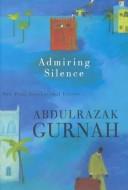Amanda Quraishi (e)k Abdulrazak Gurnah(r)en Admiring Silence liburuaren kritika egin du
Uneventful, but highly impactful.
4 izar
There is very little that happens in this Nobel Prize-winning novel, and yet, it's one of the most impactful books I've read this year. I'm married to an immigrant who came to the West, seeking opportunity and security. I've witnessed firsthand the emotional and psychological challenges that befall anyone who undertakes a cultural transition, the myriad, minor conflicts that play out in every aspect of daily life and relationships. It is a hard life, and Abdulrazak Gurnah captures it beautifully in this understated novel.
The main character, a fatherless man in his forties who immigrated from Zanzibar to England for an education, remains nameless. After moving to Great Britain in the 1960s, he meets a beautiful (and rebellious) white girl named Emma from a conservative family, and settles into a common law marriage with her. He lives almost wholly cut off from his family in Zanzibar, brushing off Emma's questions …
There is very little that happens in this Nobel Prize-winning novel, and yet, it's one of the most impactful books I've read this year. I'm married to an immigrant who came to the West, seeking opportunity and security. I've witnessed firsthand the emotional and psychological challenges that befall anyone who undertakes a cultural transition, the myriad, minor conflicts that play out in every aspect of daily life and relationships. It is a hard life, and Abdulrazak Gurnah captures it beautifully in this understated novel.
The main character, a fatherless man in his forties who immigrated from Zanzibar to England for an education, remains nameless. After moving to Great Britain in the 1960s, he meets a beautiful (and rebellious) white girl named Emma from a conservative family, and settles into a common law marriage with her. He lives almost wholly cut off from his family in Zanzibar, brushing off Emma's questions and concerns about why they have no contact, especially after the birth of their daughter. Still, it's not enough to rock the boat, and they live seemingly happily with our main character enjoying his typical western lifestyle - cocktails in the evening, a rebellious teenage daughter, and social obligations with Emma's family.
Things go smoothly until our protagonist returns to Zanzibar after twenty years (and much political upheaval), taking the reader with him. Gurnah does a masterful job of immersing us in another culture, using numerous small interactions with his people to illustrate just how differently the world appears from Zanzibar. From the colonizer to the colonized, from white to Black, from a secular environment to one that is decidedly Islamic, infused into every moment of his day.
His family wants him to come home to Zanzibar. He's got his education, and the country, having been ravaged by war and colonialism, needs him. They entice him with a fabulous government job and attempt to arrange an engagement to a beautiful young woman. Throughout, we hear his internal monologue pining for Emma, missing England, and criticizing the corruption and poor management of his home country. And yet. When he returns to England, he is confronted with the stark truth that he is not wholly of that place, and never will be.
The characters in this book feel real and vital. The main character is complicated, confused, but also cynical. He's got a great sense of humor, and many of his observations are pretty funny in a snarky, sarcastic way.
Throughout the entire time I was reading, I kept waiting for some huge, tragic event to unfold. In the end, however, the mundane reality of this man's life and experiences, representative of millions of other people who have found their way across the globe, is a powerful story without fireworks and contrivances. We are left only with his truth, which can fit nowhere but within himself, and for which there is no alternative.

